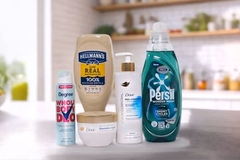Henkel’s 2024 performance: Organic sales growth amid inflation and supply chain challenges

Henkel has published its annual and sustainability reports, with a 2.6% organic sales growth bringing total sales to €21.6 billion (US$23.54 billion) despite global economic pressures. The annual report reveals that Henkel navigated inflation and supply chain disruptions by aggressively cutting costs, streamlining operations, and exiting lower-margin markets to bolster its bottom line while reshaping its portfolio.
Adjusted operating profit (EBIT) rose by 20.9% to €3.1 billion (US$3.38 billion), while net income increased by 51.7% to €2.03 billion (US$2.21 billion). The company’s sustainability report also highlights advancements in environmental, social, and governance (ESG) initiatives, including gender parity moves across leadership and leave policies.

Over the year, the global consumer goods company raised its forecast twice, initially projecting organic sales growth of 2–4%, then increasing the estimate to 2.5–4.5% by mid-year. The Consumer Brands division also saw its forecast revised upward, from 2–4% to 3–5%, ultimately achieving 3% growth.
“Over the course of 2024, we raised our forecast twice and achieved the communicated ambitious goals by the end of the year. This was also reflected in the capital market,” says Carsten Knobel, CEO at Henkel.
“Thanks to the outstanding efforts of our teams around the world, we have consistently advanced Henkel over the past year, reached or even exceeded important milestones, and, above all, underpinned the transformation of our company with sustainable financial success.”
 Carsten Knobel, CEO at Henkel.Market instability and cutting costs
Carsten Knobel, CEO at Henkel.Market instability and cutting costs
Henkel says it delivered strong results in 2024 despite a harsh economic climate. “Fiscal 2024 was once again marked by major challenges: geopolitical tensions, wars, and military conflicts in various regions of the world, economic uncertainties, and persistently strained supply chains,” Knobel says.
Inflation also remained a challenge, driving up materials, labor, and logistics costs. Additionally, Henkel says it faced supply chain disruptions caused by global instability, production delays, and struggling suppliers.
Henkel’s Consumer Brands division saw a slight 0.9% decline in sales, dropping from €10.565 billion (US$11.52 billion) in 2023 to €10.47 billion (US$11.41 billion) in 2024. However, despite the lower sales, operating profit surged by 69.4%, rising from €753 million (US$821.77 million) to €1.276 billion (US$1.39 billion). The company attributes this to portfolio shifts and cost-saving initiatives.
Henkel cut expenses across its Consumer Brands division by streamlining production, consolidating factories, and reducing reliance on third-party manufacturers. It also restructured sales and admin teams, saving €275 million (US$300 million) by year-end.
At the same time, Henkel trimmed its product lineup, dropping low-margin brands to focus on more profitable ones. It also updated its buying strategies to help offset rising material and shipping costs. These efforts helped drive a jump in operating profit as sales dipped, says Henkel.
Shifting focus
Henkel first announced it would exit oral and skin care markets in 2022 as part of a restructuring initiative of its Consumer Brands unit. Henkel confirmed in the report that it fully completed this exit in 2024 and withdrew from selective body care markets in North America and Europe.
The company prioritized hair care and high-margin categories in 2024, and the restructuring of its portfolio saw the divestment of brands totaling €1 billion (US$1.09 billion) in sales.
Meanwhile, acquiring Vidal Sassoon in China helped strengthen Henkel’s position in the premium hair care segment. The Consumer Brands division saw 6.9% organic growth in its Hair business, driven by demand for styling and color products from brands like got2b, Taft, and Schwarzkopf. Henkel increased recycled plastic use in packaging to 25%, ensuring that 89% of its packaging is now recyclable.
Henkel increased recycled plastic use in packaging to 25%, ensuring that 89% of its packaging is now recyclable.
Henkel’s Professional Hair segment also performed well, with Kenra and Joico leading sales in North America. Henkel launched new products to support this momentum, including shampoos and conditioners under the Kenra brand.
Social and environmental responsibility
The sustainability report outlines Henkel’s efforts to reduce its environmental impact and expand its circular economy initiatives. The company reaffirmed its commitment to achieving net-zero GHG emissions across its value chain by 2045. The Science Based Targets initiative (SBTi) already validated the company’s short-term goals for 2030.
In 2024, Henkel cut CO2 emissions from production by 64% per ton of product compared to 2017. The company also increased recycled plastic use in packaging to 25%, ensuring that 89% of its packaging is now recyclable.
Additionally, the report introduces Henkel’s global gender-neutral parental leave policy. Employees worldwide now get up to eight weeks of fully paid leave, supporting all parents equally.
The company is also investing in leadership diversity, with 42% of management roles now held by women. Henkel aims to reach gender parity across all leadership levels by 2025 as part of its broader cultural transformation efforts.













